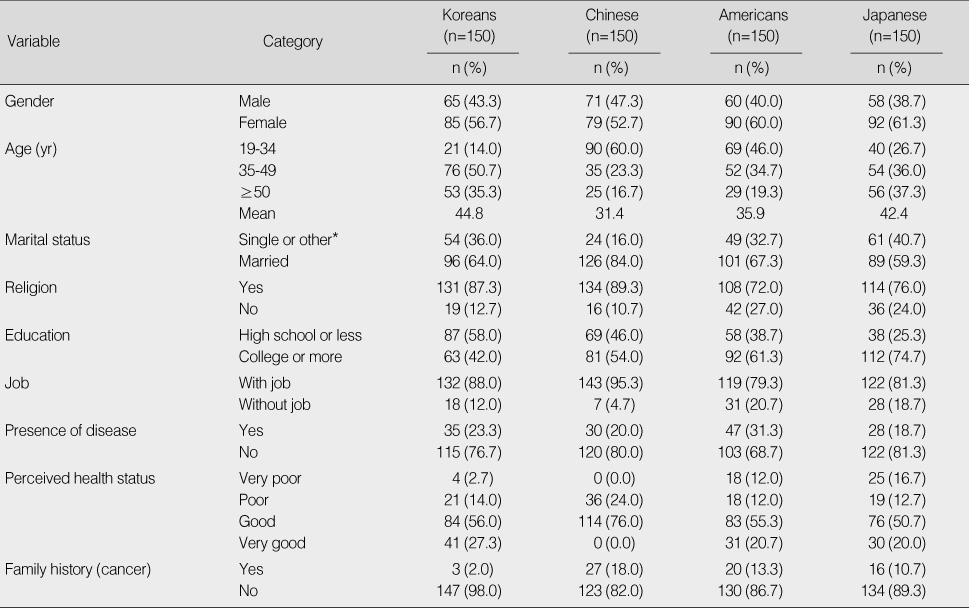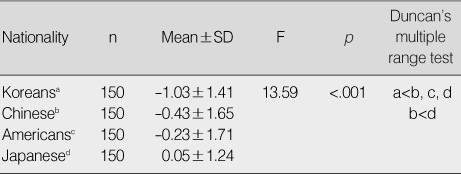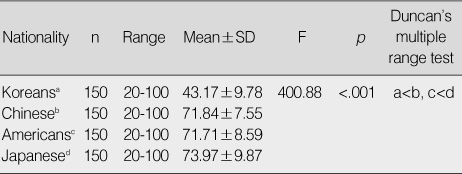Articles
- Page Path
- HOME > J Korean Acad Nurs > Volume 40(1); 2010 > Article
-
Original Article
- The Relationship between the Optimistic Bias about Cancer and Cancer Preventive Behavior of the Korean, Chinese, American, and Japanese Adult Residing in Korea
- Sul Hee Lee, Eun Mi Ham
-
Journal of Korean Academy of Nursing 2010;40(1):52-59.
DOI: https://doi.org/10.4040/jkan.2010.40.1.52
Published online: February 28, 2010
1Nurse, Konkuk University Hospital, Seoul, Korea.
2Professor, Department of Nursing, Konkuk University, Chungju, Korea.
- Address reprint requests to: Ham, Eun Mi. Department of Nursing, Konkuk University, 322 Danwol-dong, Chungju 380-701, Korea. Tel: 82-43-840-3958, Fax: 82-43-840-3958, hem2003@kku.ac.kr
• Received: July 31, 2009 • Accepted: January 18, 2010
Copyright © 2010 Korean Society of Nursing Science
Abstract
-
Purpose
- This study was conducted to provide basic data for developing education and health promotion programs for the prevention of cancer by identifying the relation between optimistic bias about cancer and cancer preventive behavior in Korean, Chinese, American, and Japanese residents in Korea.
-
Methods
- Using a questionnaire administered by the researcher, data were collected from a convenience sample of 600, 19 to 64-yr-old male and female Korean, Chinese, American, and Japanese residents in Korea. Data was collected between February 6 and 28, 2009.
-
Results
- Scores for optimistic bias about cancer by nationality were: Koreans, -1.03; Chinese, -0.43; Americans, -0.23; and Japanese, 0.05. The cancer preventive behavior scores were: Koreans, 43.17; Chinese, 71.84; Americans, 71.71; and Japanese, 73.97. Optimistic bias about cancer and cancer preventive behavior showed a significantly positive correlation in all participants: Koreans (r=.223, p=.006); Chinese (r=.178, p=.029); Americans (r=.225, p=.006); and Japanese (r=.402, p<.001).
-
Conclusion
- The greater the optimistic bias about cancer is, the lower the cancer preventive behavior. The findings suggest that nursing interventions are needed to reduce optimistic bias about cancer and to form a positive attitude towards cancer prevention because an optimistic bias about cancer adversely affects cancer preventive behavior.
This article is based on a part of the first author's master's thesis from Konkuk University.
This study was financially supported by Konkuk University in 2009.
- 1. Barnoy S, Bar-Tal Y, Treister L. Effect of unrealistic optimism, perceived control over disease, and experience with female cancer on behavioral intentions of Israeli women to undergo screening tests. Cancer Nursing. 2003;26:363–369.Article
- 2. Bright MA. Public health initiatives in cancer prevention and control. Seminars in Oncology Nursing. 1993;9:139–146.ArticlePubMed
- 3. Cha JH. Han SB, Cha JH, Lee MY, Yang C, Ahn BM, Shin YK. The personality and consciousness of the Korean people. In: Studies of the continuity and change of a culture. 1980;Seoul, Korean Social Science Research Council. 6–58.
- 4. Chang EC, Asakawa K. Cultural variations on optimistic and pessimistic bias for self versus a sibling: Is there evidence for self-enhancement in the West and for self-criticism in the East when the referent group is specified? Journal of Personality and Social Psychology. 2003;84:569–581.ArticlePubMed
- 5. Clarke VA, Lovegrove H, Williams A, Machperson M. Unrealistic optimism and the health belief model. Journal of Behavioral Medicine. 2000;23:367–376.ArticlePubMedPDF
- 6. Fontaine K, Smith S. Optimistic bias in cancer risk perception: A cross-national study. Psychological Reports. 1995;77:143–146.ArticlePubMedPDF
- 7. Heine S, Lehman D. Culture variation in unrealistic optimism: Does the West feel more invulnerable than the East? Journal of Personality and Social Psychology. 1995;68:595–607.Article
- 8. Jang HM. The effect of emotion-inducing message on attitude and behavioral intention in public health campaign: Focusing on the mediating effect of perceived behavioral control and optimistic bias. 2007;Seoul, Seoul National University. Unpublished master's thesis.
- 9. Jeong JY. The effect of optimistic bias on risk perception and attitude: Focused on campaign strategy for prevention of childhood obesity. 2007;Seoul, Ewha Womans University. Unpublished master's thesis.
- 10. Jun EM, Cho DS. The relationship of symptoms of stress, cancer preven-tion behavior and the quality of life in women. Korean Journal of Women Health Nursing. 2005;11:156–162.ArticlePDF
- 11. Katapodi MC, Lee KA, Facione NC, Dodd MJ. Predictors of perceived breast cancer risk and the relation between perceived risk and breast cancer screening: A meta-analytic review. Preventive Medicine. 2004;38:388–402.ArticlePubMed
- 12. Kim BC, Choi MI, Lee DG. Optimistic bias and third-person effect about school violence. Journal of Public Relations Research. 2006;10:168–196.
- 13. Kim BC, James M, Choi MI, Choi YH. Cultural difference study on optimistic bias of AIDS: Comparison between Korea and Kenya. The Korean Journal of Advertising. 2007;18:111–130.
- 14. Kim JE. Consciousness and behavior pattern of Koreans. 1987;Seoul, Ewha Womans University.
- 15. Lee DS. A study on the relationships between unhealthy dietary habit, optimistic bias about gastric cancer occurrence and self-efficacy in Korean adult men. Korean Journal of Rehabilitation Nursing. 2003;6:117–126.
- 16. Lee KJ, Chang CJ, Yoo JH, Yi YJ. Factors effecting health promoting behaviors in middle-aged women. Journal of Korean Academy of Nursing. 2005;35:494–502.ArticlePubMedPDF
- 17. Lim MK. Cancerous epidemiology and prevention. Journal of Korean Oncology Nursing. 2008;8:21–27.
- 18. Ministry For Health, Welfare and Family Affairs. Annual report of national cancer registration, 2008. 2008;10;Seoul, Author.
- 19. Park SH, Lee SH, Ham EM. The relationship between optimistic bias about health crisis and health behavior. Journal of Korean Academy of Nursing. 2008;38:403–409.ArticlePubMed
- 20. Park SY. The effects of a cancer prevention and early detection education on cancer-related knowledge, attitudes, and preventive health behavior of middle-aged women in Korea. 2000;Daegu, Keimyung University. Unpublished master's thesis.
- 21. Perloff LS. Snyder CR, Ford CE. Social comparison and illusion of invulnerability to negative life event. In: Coping with negative life events: Clinical and social psychological perspectives. 1987;New York, NY, Plenum Press. 217–242.
- 22. Roh HS. The impact of family cancer history on preventive health behaviors: Based on the Health Belief Model. 2007;Seoul, Seoul National University. Unpublished master's thesis.
- 23. Suh SR, Jung BY, So HS, Tae YS. A study to advance the development of educational programs for the early detection and prevention of the five major cancer in Korea. Journal of Korean Academy of Adult Nursing. 1998;10:268–280.
- 24. Weinstein ND. Why it won't happen to me: Perception of risk factors and susceptibility. Health Psychology. 1984;3:431–457.ArticlePubMed
- 25. Weinstein ND, Marcus SE, Moser RP. Smokers' unrealistic optimism about their risk. Tobacco Control. 2005;14:55–59.ArticlePubMedPMC
- 26. World Health Organization. World health statistics 2008. 2008;Geneva, Author.
- 27. Yoo KY, Shin HR. Cancer epidemiology and prevention. Korean Journal of Epidemiology. 2003;25:1–15.
REFERENCES
Figure & Data
REFERENCES
Citations
Citations to this article as recorded by 

- Influencing optimistic bias: Moderating roles of perceived severity and proximity
Hyuksoo Kim, YoungAh Lee
Journal of Consumer Behaviour.2024; 23(4): 1832. CrossRef - Well-informed or misinformed? News-Finds-Me perception in shaping sexual and reproductive health knowledge and behavioral intentions among Chinese women
Lianshan Zhang, Piper Liping Liu, Chervin Lam, Zhongwei Huang
Social Science & Medicine.2024; 359: 117271. CrossRef - Facile Synthesis, Optimization of Zinc Oxide & Magnesium Oxide Nanoparticles Using Solanum Torvum and Their Activity Against MM2 and HeLa Cancer Cells
M. Kalaimathi, S. Sisira, K. S. Hithisha, J. Syama Sankar, R. K. Vimalraj, M. Kalaimathi
SSRN Electronic Journal .2022;[Epub] CrossRef - Isolation, purification and cytotoxic evaluation of lutein from mixotrophically grown Chlorella sorokiniana TH01
Cuc T. Dinh, Cam Van T. Do, Thu Phuong T. Nguyen, Ngoc Hieu Nguyen, Truong Giang Le, Thuan Dang Tran
Algal Research.2022; 62: 102632. CrossRef - Differences in Willingness to Undergo BRCA1/2 Testing and Risk Reducing Surgery among the General Public, Cancer Patients, and Healthcare Professionals: A Large Population-Based Survey
Yoon Jung Chang, Seungyeon Cho, Jungnam Joo, Kum Hei Ryu, Sangwon Lee, Juhee Cho, Myong Cheol Lim, So-Youn Jung, Jai Hong Han, Eun Sook Lee, Sun-Young Kong
Journal of Personalized Medicine.2022; 12(5): 818. CrossRef - Predictors of Hepatitis B Virus Infection Vaccine Hesitancy Among Pregnant Women Attending Antenatal Care at Lubaga Hospital, Kampala, Uganda
Ismail Bamidele Afolabi, Abdulmujeeb Babatunde Aremu, Lawal Abdurraheem Maidoki, Nnodimele Onuigbo Atulomah
International Journal of Women's Health.2022; Volume 14: 1093. CrossRef - Improving the cancer prevention/treatment role of carotenoids through various nano-delivery systems
Mahboobeh Zare, Zahra Norouzi Roshan, Elham Assadpour, Seid Mahdi Jafari
Critical Reviews in Food Science and Nutrition.2021; 61(3): 522. CrossRef - Prenatal hepatitis B screening and associated factors in a high prevalence district of Lira, northern Uganda: a community based cross sectional study
Paul Semakula Katamba, David Mukunya, Doris Kwesiga, Victoria Nankabirwa
BMC Public Health.2019;[Epub] CrossRef - The Effects of the Stroke on the Health Knowledge, Optimistic Bias and Health-Promoting Lifestyle in Middle-Aged Adults
Young-Ju Jeong, Jin-Hee Park
Journal of the Korea Academia-Industrial cooperation Society.2016; 17(9): 141. CrossRef - Cross-cultural Validation of Instruments Measuring Health Beliefs about Colorectal Cancer Screening among Korean Americans
Shin-Young Lee, Eunice E. Lee
Journal of Korean Academy of Nursing.2015; 45(1): 129. CrossRef - Knowledge, Attitude, and Preventive Health Behavior of Cancer in Middle-aged Men
Youngrye Park, Hwee Wee
The Korean Journal of Rehabilitation Nursing.2014; 17(2): 97. CrossRef - Factors affecting Cancer Preventive Behavior in Middle-aged People
Nam Sun Kim, Kyu Eun Lee
Journal of Korean Academy of Fundamentals of Nursing.2014; 21(1): 29. CrossRef - Estimated risks and optimistic self-perception of breast cancer risk in Korean women
ChaeWeon Chung, Suk Jeong Lee
Applied Nursing Research.2013; 26(4): 180. CrossRef - Comparison of Factors Associated with Intention to Receive Human Papillomavirus Vaccine Between Male and Female Undergraduate Students
Hae Won Kim
Korean Journal of Women Health Nursing.2011; 17(4): 415. CrossRef
The Relationship between the Optimistic Bias about Cancer and Cancer Preventive Behavior of the Korean, Chinese, American, and Japanese Adult Residing in Korea
The Relationship between the Optimistic Bias about Cancer and Cancer Preventive Behavior of the Korean, Chinese, American, and Japanese Adult Residing in Korea
General Characteristics
*Separation, divorce, separation by death.
Optimistic Bias about Cancer according to the nationality
Cancer Preventive Behavior according to the nationality
Correlation between Optimistic Bias and Preventive Behavior
Table 1
General Characteristics
*Separation, divorce, separation by death.
Table 2
Optimistic Bias about Cancer according to the nationality
Table 3
Cancer Preventive Behavior according to the nationality
Table 4
Correlation between Optimistic Bias and Preventive Behavior
 KSNS
KSNS
 E-SUBMISSION
E-SUBMISSION




 Cite
Cite

